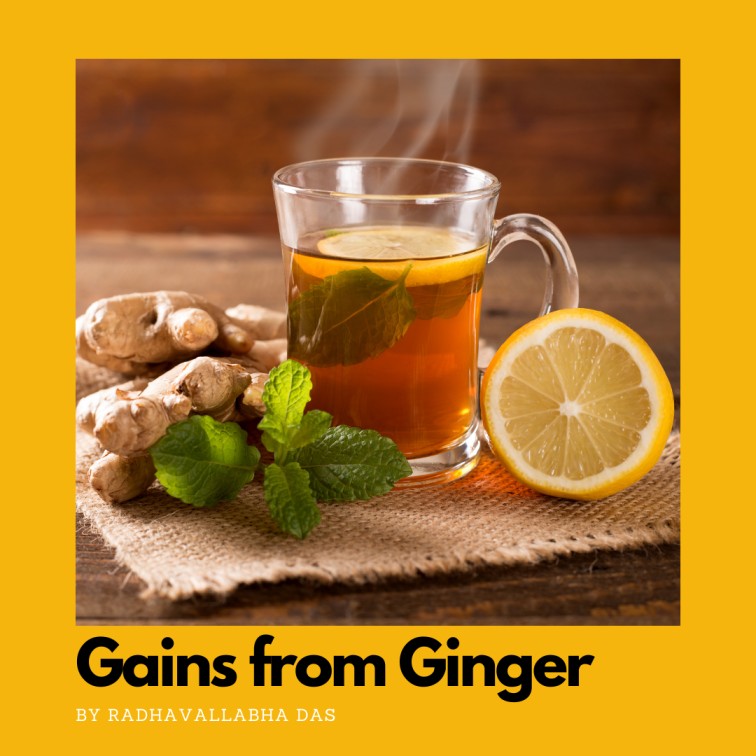GAINS FROM GINGER

Food should be local, but spices should be global. Apart from imparting taste, spices are known for their medicinal benefits. For example, turmeric is known to purify blood and modern-day research has proven that turmeric does prevent cancer. In this article we will discuss the medicinal quality of ginger, its application in various cuisines and one recipe.
Ginger, Adraka or Sunthi (sun dried ginger) in Sanskrit, is a very useful ingredient in the family of hot pungent spices. Both fresh as well as dried ginger have the same health benefits. This root not only mitigates cold and flu but also prevents the causes. It also eliminates vāta (gas related disorder) which are root causes of pain such as back pain. Ginger is an excellent spice to kindle the digestive fire and that’s shows the fiery side of ginger. Black pepper, another fiery spice, is more aggressive, in the sense that post digestion it is pungent too, whereas that of ginger is sweet. That is, ginger is hot on the tongue and during digestion in the stomach, and the taste becomes sweet after digestion. So, ginger is less likely to cause acidity or heart burn. On the top of that it balances vāta, which means it will prevent bloating. We cannot add too much black pepper, yet we can increase the amount of ginger in a dish without a hitch. But the fire from ginger also needs to be moderated. So, many cooling spices and herbs are added at the right time and in appropriate quantities.
There are a few more pungent spices (such as long pepper or pippali), but Ācārya Vāgabhaṭa, Einstein of Ayurvedic Science, does not encourage their use in cooking, but only as medicines. Ginger which is a source of fire, is used in cooking to aid digestion, which happens in a very controlled environment of stomach. But this fire also needs to be moderated. So, many cooling spices and herbs are added at the right time and in appropriate quantities. We will discuss a few such spices.
Ginger in Various Cuisines
Despite all the above advantages, I don’t see ginger used much in South India, or as much as it is in the North and Central India. The preferred spice in the region is pepper, better suited to the hot climate of the South. Some recipes use ginger, especially those with sprouts as the major ingredient, in curd rice and butter milk.
Ginger is not prominent in European cuisines, probably because it was difficult to transport fresh ginger, and dried ginger is mostly used as medicines and difficult to produce and trade. Black pepper however was handy for the traders and did not spoil easily. On the other hand, Chinese cuisines value ginger as highly as pepper. Unfortunately, in India, use of chilli pepper has replaced in recipes that would originally use black pepper and ginger, whereas Chinese and European cuisines still prefer pepper and ginger as the key pungent spice.
Use of Ginger in various Recipe
Ginger must be added to heavy food, such as lentils, soaked chickpeas and kidney beans (Chole and Rajma). The quantity of ginger should increase in proportion to the heaviness of the ingredients and dish preparation. For example, chickpeas require almost 3 times the quantity of ginger that moong beans do.
Other Benefits
Ginger also counters weight gain, indigestion, cough and dyspnea (difficulty in breathing) and relieves constipation.
Ginger appears to be very effective against menstrual pain when taken at the beginning of the menstrual period.
Gingerol is the main bioactive compound in ginger. It’s responsible for much of ginger’s medicinal properties. Gingerol has powerful anti-inflammatory and antioxidant effects.
Ginger appears to be highly effective against nausea. It may help relieve nausea and vomiting for people undergoing certain types of surgery. Ginger helps in chemotherapy-related nausea. It may be the most effective when it comes to pregnancy-related nausea, such as morning sickness. According to a review of 12 studies that included a total of 1,278 pregnant women, 1.1–1.5 grams of ginger can significantly reduce symptoms of nausea. However, this review concluded that ginger had no effect on vomiting episodes.
Although ginger is considered safe, talk with your doctor before taking large amounts if you’re pregnant.
It’s recommended that pregnant women who are close to labor or who’ve had miscarriages avoid ginger. Ginger is contraindicated with a history of vaginal bleeding and clotting disorders as well.
Ginger may play a role in weight loss, according to studies conducted in humans and animals.
Ginger has been studied as an alternative remedy for several forms of cancer.
Ginger tea is very effective in relieving cold and cough. We will conclude with a recipe of ginger tea.
Recipe for Ginger Tea
Ingredients
- 2 tbsp fennel seeds
- 1 tsp grated ginger
- 1 bay leaf
- 5 cups water
- 2 tbsp brown sugar or Jaggery
- 1/2 tsp fresh lemon juice
Directions
- Bring the water to a boil.
- Except lemon juice add all other ingredients. Boil steadily for 10-15 minutes.
- Turn off the fire and stir in the lemon juice.
Filter and serve hot.
